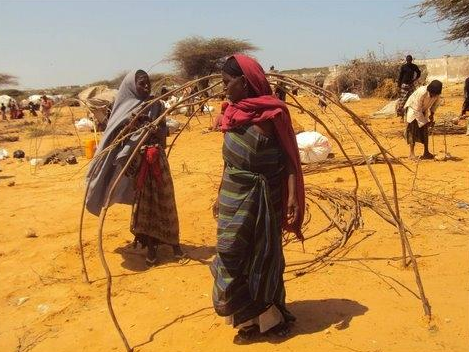Somali famine getting less attention, still ‘not solved’
Minneapolis — Humanitarian aid workers from Minnesota predict the famine in Somalia will get worse before it gets better.
Much-needed rain is expected to fall on the East African country over the next couple of months. But ironically, increased rainfall could deepen the crisis for the four million people there who need help.
“Rain is a good thing, if you are in a good house, if you are in your home,” said Mohamed Idris of Brooklyn Park, who recently returned from the capital city of Mogadishu.
He is executive director of the American Relief Agency for the Horn of Africa. He says rain is also a blessing for farmers who never left their fields or livestock.
“But if you are in a refugee camp, or you are in a displaced place where your house does not protect you from rains, and you don’t have bathrooms, this will increase the spread of diseases — cholera and things like that,” said Idris. “That’s usually what happens when rain hits refugee camps that are not prepared.”
He says, imagine 100 families with just one toilet to share. They’re forced to relieve themselves wherever they can. When the rain finally comes, the water that people harvest from places like ponds or rivers will likely be contaminated.
Last month while delivering food baskets to people in the camps, Idris met an old man who pulled him into his hut and begged him to save his sick wife.
The veteran aid worker says he was saddened to find desperate hordes of people living on the streets. The famine has killed tens of thousands of Somali children since the United Nations officially declared the famine three months ago.
“I felt some disappointment because with the attention the media gave the famine, and with all the talk about organizations in Somalia, you would think things had improved,” said Idris. “But when I came there and visited these camps, really I felt that there’s a lot of work to do.”
Celebrities such as Bono and Somali-born musician K’Naan have tried to shine a light on the crisis. But the president of the Minneapolis-based American Refugee Committee, Daniel Wordsworth, says the famine continues to suffer from a lack of awareness.
“It has dropped off the radar, and it’s gotten worse since it dropped off the radar,” said Wordsworth. “It’s not like the famine is solved. Sometimes people see it in the news a month ago or two months ago, and they feel it must have been solved somehow. And it hasn’t been.”
That’s one reason the ARC has launched its own online video showing everyday Minnesotans doing their part to keep the donations flowing. The ARC is working with the nation’s largest Somali-American community, here in Minnesota, to keep the story alive.
Yet the ARC’s Wordsworth says enormous challenges remain in delivering aid, especially in hard-to-reach areas in southern Somalia. The extremist group al-Shabab controls much of the region. Bandits are another concern. International aid workers like Dr. Ismail Mualin rely on bodyguards, which he says are skinny young guys with AK-47s.
Mualin, of San Diego, volunteered for three weeks at Mogadishu’s Benadir Hospital. Mualin left his homeland more than 20 years ago, and practiced internal medicine at Regions Hospital in St. Paul for many years.
Maulin says he went from one of the most advanced health care systems in the world in the U.S. to a hospital where three kids a day were dying from things like dehydration, measles, or malaria. He had never seen anything like it.
___
MPR
Comments
comments
 Calendar
Calendar







































